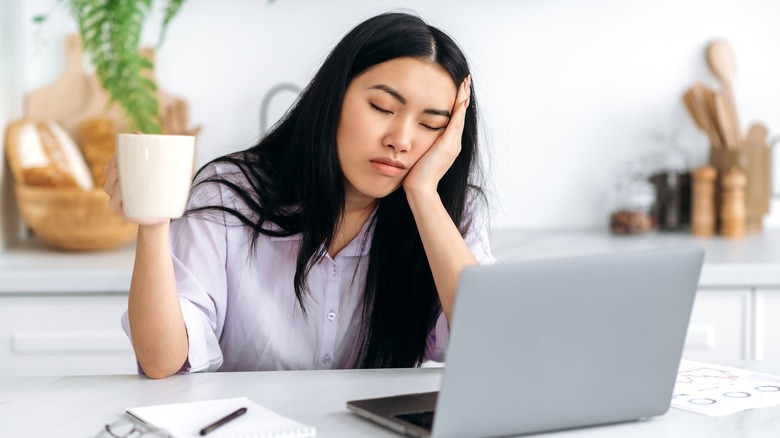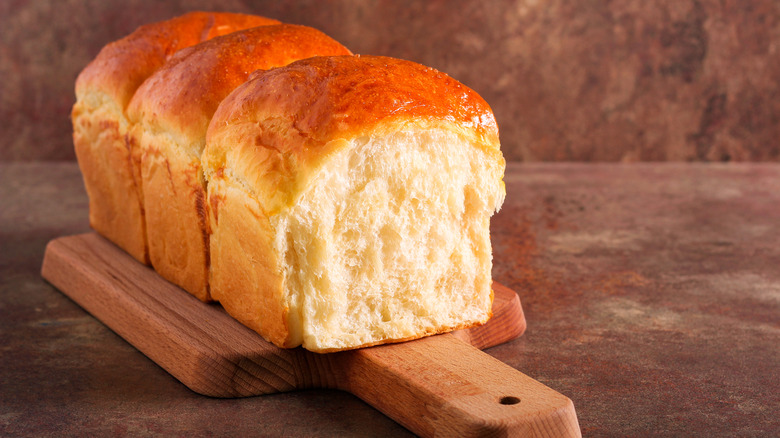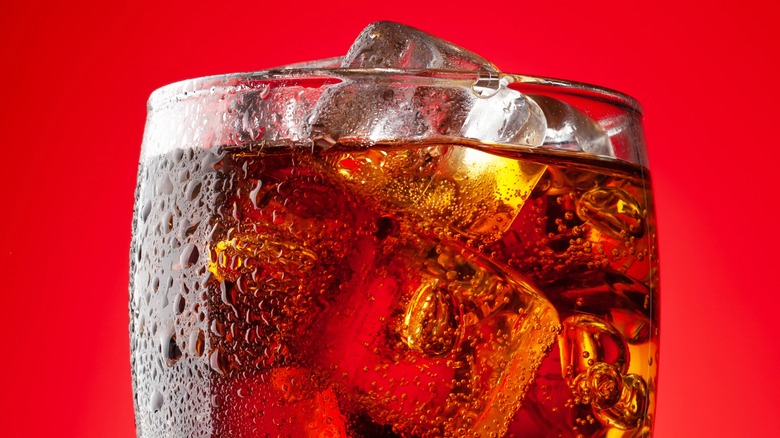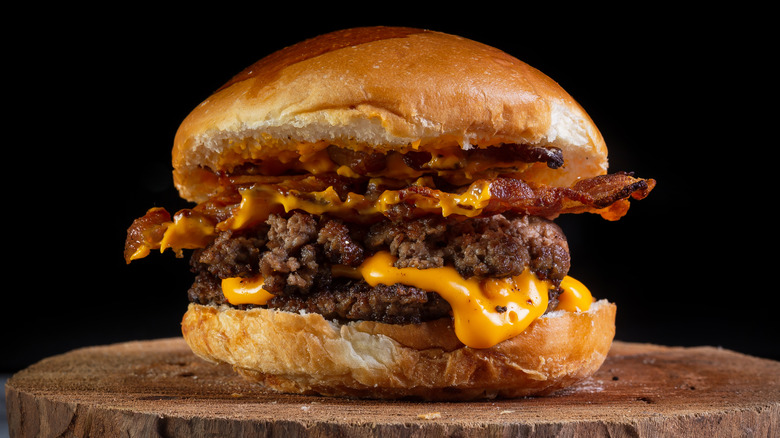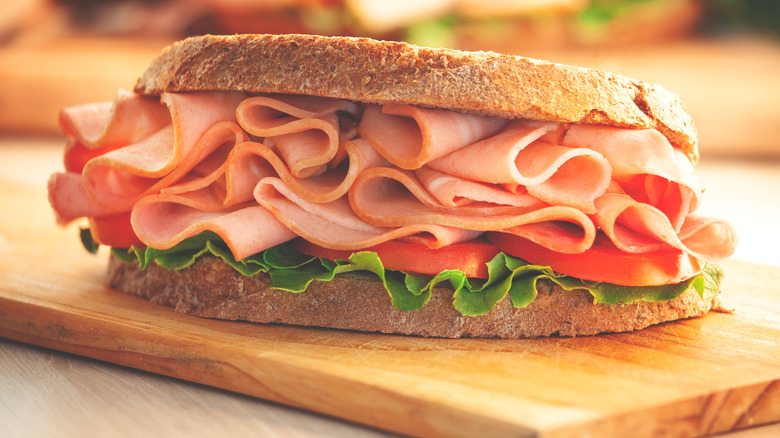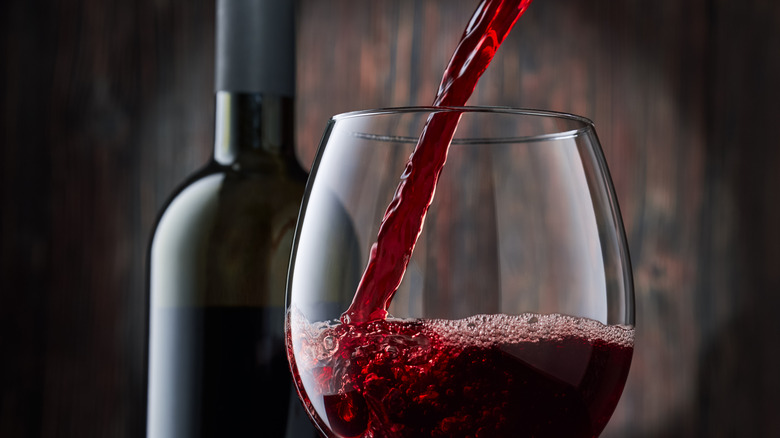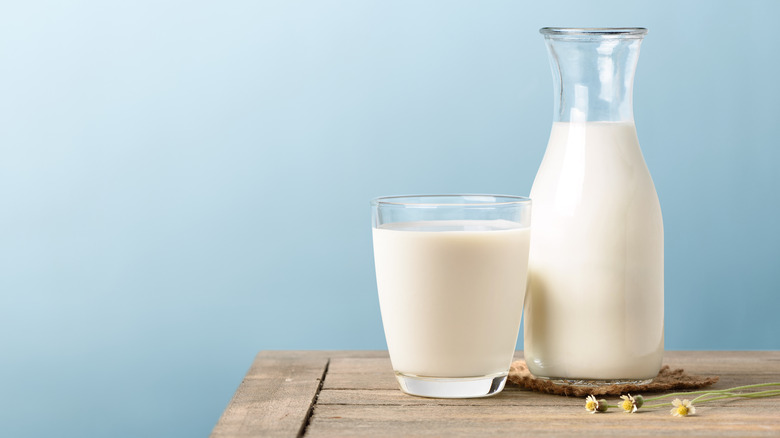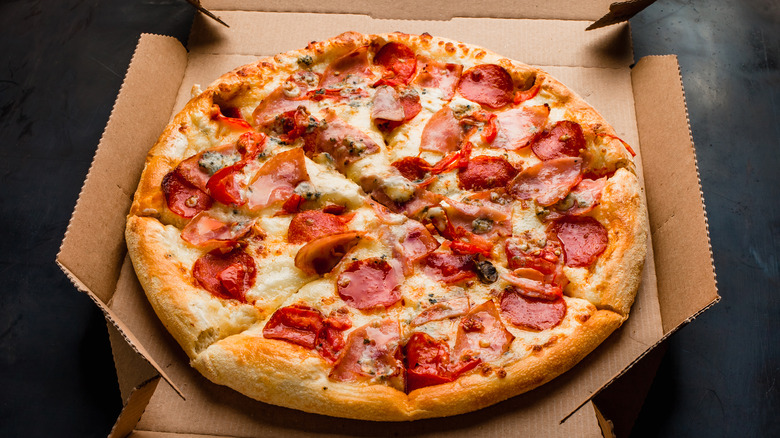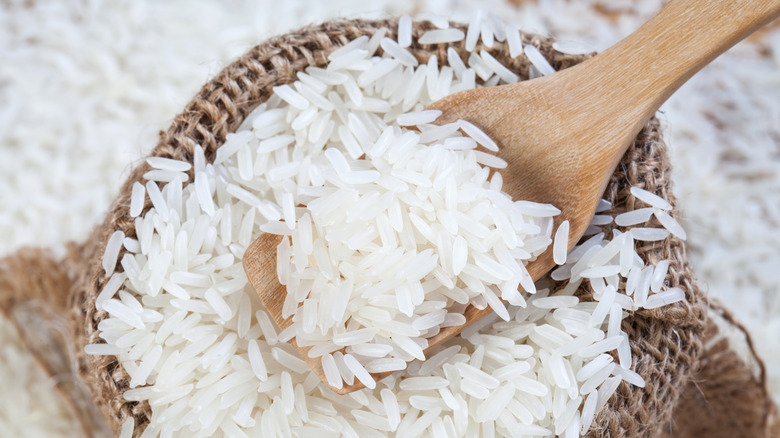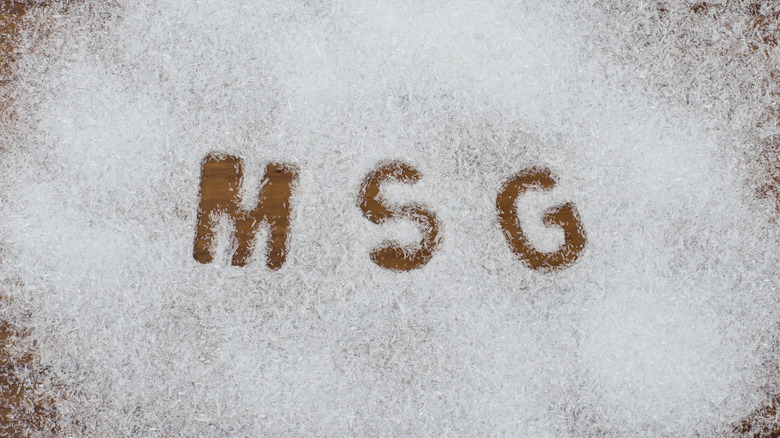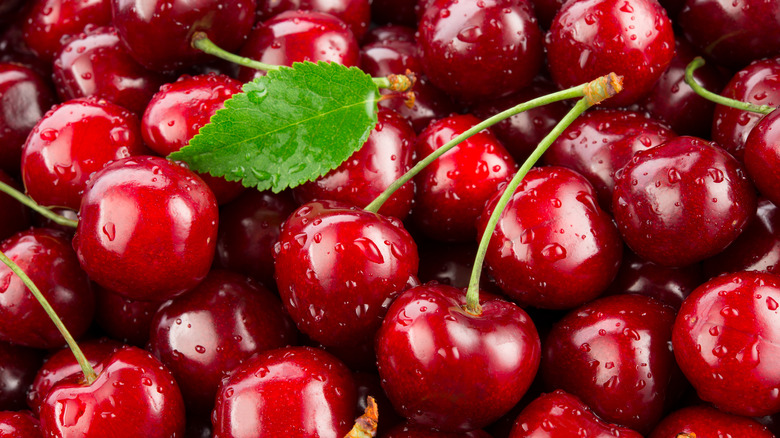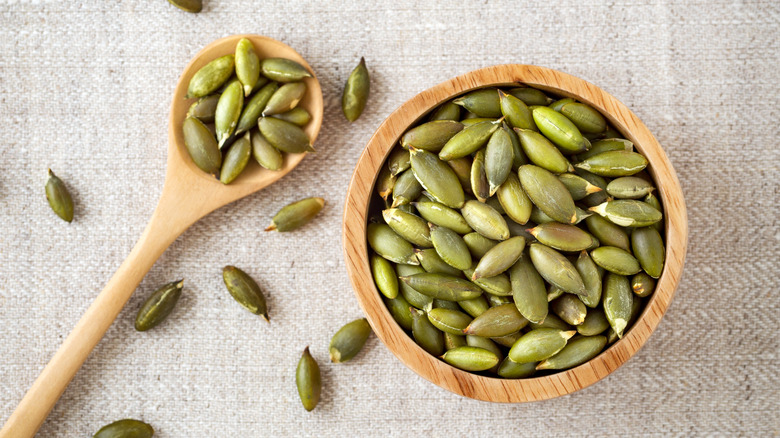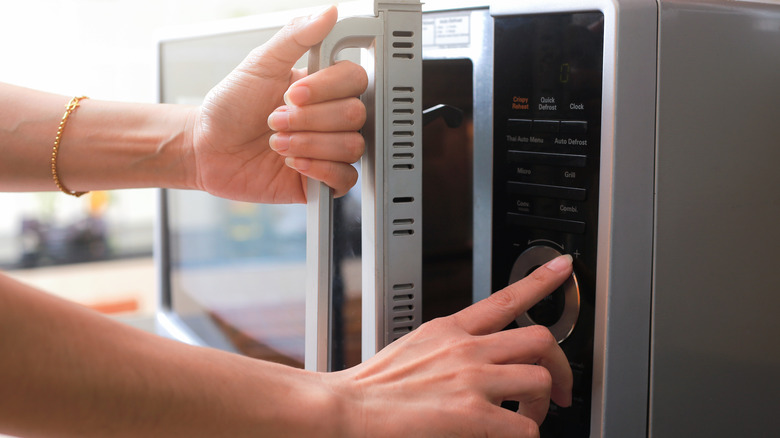Common Lunch Foods That Drain Your Energy
There's no denying that a fair number of people wake up feeling sluggish. In fact, it might take a while to become fully alert and ready for the day. But have you ever noticed that by mid-afternoon you might feel a bit tired? Why? After all, you've been up for several hours and had lunch — shouldn't eating something be fueling you?
Well, as GoodRx points out, it's common for people to experience what's known as an "afternoon slump" when their energy and focus decrease. Now, there are a number of things that can contribute to this drop in alertness. For example, being stressed can throw off your energy. However, what you choose to eat at lunchtime can also at least contribute to if not be a major factor behind your afternoon slump. But it's not necessarily as simple as cutting out one food and suddenly not feeling sluggish anymore.
Remember, everyone is different, which means an energy-zapping food for one person might not have the same (or as significant) effect on someone else. It also might be a combination of certain foods that could be the real culprit behind your "afternoon slump." And, of course, portion control and preexisting health concerns can play roles when it comes to decreases in energy and focus. Bottom line: If you believe what you eat might be affecting your alertness, you might want to speak with a health care professional.
Bread
According to Britannica, John Montagu was the 4th earl of Sandwich and during a 24-hour gambling session ate only (you guessed it) sandwiches. While this story might be more legend than fact, the sandwich is a convenient food for multitaskers. Just as the earl could continue gambling while eating one, the modern professional can easily eat one at their desk. But even though sandwiches are convenient, there can be a price to pay regarding your energy levels.
As Livestrong explains, if sandwiches leave you feeling sluggish, it could be the bread is draining your energy in more than one way. For starters, white bread could be quickly raising your blood sugar. This is because certain foods have what's known as a high glycemic index, which means they're broken down by your body more quickly than other foods, leading to that fast increase in blood sugar. And as clinical nutritionist Lauryn Lax points out to Livestrong, "Bread generally spikes blood sugar, only to send it back down shortly after due to the glycemic impact on the body." It's that drop in blood sugar that can leave you feeling tired.
Besides bread's glycemic index, breads made from grains like wheat, rye, and barley can also contain proteins known as gluten (per Institute of Food Science & Technology). And if you have celiac disease or are gluten intolerant, then eating foods that contain these proteins can not just make you tired but fatigued, via Harvard Health Publishing.
Caffeinated beverages
It might be surprising to see caffeine on a "foods that drain your energy" list. After all, many people can't start their day without at least one cup of coffee. But beverages like soda, energy drinks, tea, and yes, even coffee, might not be giving you the "pick-me-up" you think they are.
As registered dietician Vanessa Rissetto told PureWow, "The most well-known effect caffeine has on the brain is alertness, but that isn't the only one." In fact, that jolt of energy from caffeine can be a double-edged sword. There's a compound in your body called adenosine, which is a factor in why we feel tired. Caffeine binding to the adenosine receptors in your brain is why you feel temporarily alert after drinking caffeinated beverages. But even if your brain's receptors aren't, well, receptive to adenosine, your body continues to make it. So, when the caffeine eventually wears off, your brain is hit with more adenosine than it normally would have been, and that can lead to sluggishness.
If caffeine could be behind your post-lunch sluggishness, shouldn't removing caffeine from your diet solve the problem? Well, it's a little more complicated than that. As Worley tells Livestrong, a person can become physically dependent on caffeine, so suddenly not consuming it can cause health issues like fatigue. Also, different caffeinated beverages are diuretics and can cause dehydration. And as Worley explains, "That dehydration combined with caffeine withdrawal and the adenosine buildup can make someone feel exhausted."
Cheeseburgers
Cheeseburgers are one of those foods that can be in multiple lunch scenarios. A person working at an office might run out to a local fast food place for one. A family on a road trip might grab a few at a convenient drive-thru. And someone relaxing at a barbecue is likely to have the option of a freshly cooked cheeseburger. But no matter where someone gets a cheeseburger, it could be at least part of the reason behind afternoon sluggishness.
First, cheeseburgers are typically served on bread, which can spike one's blood sugar and lead to drowsiness (via Livestrong). Also, cheese contains tryptophan, an amino acid that's connected to sleep, per MedlinePlus. And according to a study conducted by researchers at the University of Adelaide in Australia found a possible connection between eating fatty foods that are greasy and/or processed and feeling tired during the day (via Men's Journal). The study's conclusion pointed to the amount of fat playing a role, and as Men's Health noted, eating a bacon cheeseburger along with other fatty foods throughout the day can be enough fat grams to zap one's energy. In fact, the USDA lists a "210 g serving" of a 7-Eleven bacon cheeseburger can have almost 36 grams of "total lipid (fat)."
If you suspect cheeseburgers (or frankly any food) are behind your sluggishness, you should start keeping a food journal. This way you can write down what you eat at what times and when you begin to feel tired.
Turkey
Poor turkey has been arguably branded the king of the foods that leave you tired. We've all heard about the "turkey comas" people experience at Thanksgiving (and chances are you've experienced at least one in your life). But there's a bit more to the story.
Of course, we can't talk about turkey and drops in energy without first discussing tryptophan. As MedlinePlus explains, this amino acid helps your body produce serotonin and melatonin, which are both crucial for sleep. So, eating turkey means consuming tryptophan and making more of what your body needs to sleep. Mystery solved, right? Not so fast. According to the Sleep Foundation, while the tryptophan in turkey can be a factor when it comes to sluggishness, it's when we eat it with foods rich in carbs that the so called "turkey coma" occurs. So, if you eat a turkey sandwich on white bread for lunch, you could be eating the perfect combination for an afternoon energy crash.
While turkey could be part of why you feel tired after lunch, you don't want to stop consuming foods that contain tryptophan. As MedlinePlus points out, your body needs tryptophan for functions like maintaining your muscles. And your body can't produce it on its own, meaning foods that contain it are important for your diet. So, next time you consider turkey for lunch, think about what you're pairing it with and how much of it you're eating. Or you might want to save it for the evening.
Alcohol
How many times have you seen this scenario: A character on TV or in the movies drinks too much alcohol and eventually is passing out in a public place like a bar or a party? While this might seem cliché, it's used in part because most people understand that alcohol can make one feel tired. However, there's more to alcohol, sluggishness, and sleep.
As Healthline explains, alcohol can make you tired because it affects the central nervous system. What's more, if you didn't sleep well the night before, even a small amount of alcohol (for instance, one drink), can leave you feeling sluggish especially if you drink it during your afternoon slump (via Harvard). Okay, so if not sleeping well the night before can impact whether or not you feel tired during the day — and alcohol can make you sleepy — then is drinking alcohol before bed a good idea? Actually, no. A nightcap might make you feel tired but a few hours later can elevate the stress hormone epinephrine. In other words, while alcohol might help you fall asleep initially, it can also cause you to wake up during the night, leading to less restful sleep.
The bottom line is having alcohol at lunch can cause afternoon drowsiness (per Healthline) and having a nightcap before bed can affect your sleep and make you more likely to experience tiredness during the day (per Harvard). So, if you're having trouble sleeping, you should speak with a health care professional.
Dairy
While dairy foods like cheese and milk contain tryptophan — which helps your body produce a hormone and a neurotransmitter it needs to sleep (via MedlinePlus) — that's not the only reason why dairy products might leave you feeling tired. Remember, a person can have lactose intolerance, which means they have problems digesting foods made from milk (per The Optimum Health Clinic). Now, you're probably aware of (some) symptoms of this health condition like diarrhea and bloating. However, fatigue and lactose intolerance can also go hand in hand.
According to the Centers for Disease Control and Prevention (CDC), myalgic encephalomyelitis/chronic fatigue syndrome is an illness where a person has problems doing everyday activities because of extreme exhaustion. Even getting out of bed can be very difficult for someone with this health issue. And as The Optimum Health Clinic points out, a possible symptom of ME chronic fatigue is lactose intolerance. A person with ME chronic fatigue might also have a milk allergy, which is different than lactose intolerance but can result in lethargy.
If you suspect that dairy could be connected to any of these health issues, you should contact a health care professional. There are treatments and food options available. For example, The Optimum Health Clinic explains that a person who is both lactose intolerant and experiencing ME chronic fatigue might be able to eat foods like cottage cheese, lassi, or yogurt since these foods have bacteria that might help them digest these milk products.
Sugary desserts
Imagine this: You're at work and finishing lunch when you find out it's a coworker's birthday. Of course, there's cake in this scenario, and not wanting to be rude, you take a piece. Not too long after, you feel sluggish, and shrug it off to a "sugar crash." But not so fast. There might be more behind your energy dropping.
So, let's first talk about the carbs in that slice of birthday cake. As registered dietician Julia Zumpano told the Cleveland Clinic, "After you eat a meal, your blood sugar rises. Insulin goes into the bloodstream to take the sugar out of the blood and put it in the cells for energy." But a rise in blood sugar (especially a spike in it) can result in plunge in alertness. However, if you're body doesn't produce enough insulin, that can also affect your energy levels. But we are overlooking something important in the above scenario: You ate the cake right after finishing lunch.
Now, let's assume you had a protein-heavy lunch. A combination of foods loaded with protein and carbohydrates can result in sluggishness, according to the Cleveland Clinic. Plus, Zumpano adds, "So, if you're eating a heavier meal or a bigger meal, you're more likely to feel sluggish because your body has to work a little extra hard to digest that meal." While a little sweet treat at lunch can be nice, it could also be at least a factor behind your tiredness.
Fast food
We talk about cheeseburgers elsewhere in this article — but let's not forget that while burgers of all kinds are practically staples of the fast food industry, they are hardly the only food these franchises serve. Now, in all fairness, not every item might be a problem. And there's no denying that fast food can be very convenient, especially if you have only so long to eat lunch. But you still need to be a conscientious consumer when it comes to this lunchtime favorite.
According to the Cleveland Clinic, the refined carbs and sugar found in some fast food items can spike and crash your blood sugar, which can lead to a drop in energy. Let's explore this with a common fast food item: Pizza. According to the U.S. Department of Agriculture (USDA), one slice (which is equal to 100 grams) of a Pizza Hut 12-inch Cheese Pizza (with a pan crust) contains almost 30 grams of carbohydrates, as well as 3.21 grams of sugar. Additionally, foods that have fiber can take longer to digest and so are less likely to cause blood sugar spikes. But that same slice of Pizza Hut pizza has only 1.7 grams of fiber.
Now to be fair, protein can also slow down digestion, and the Pizza Hut pizza does contain 11.7 grams of protein per slice (via the USDA). But as we discuss elsewhere in this article, foods packed with protein and carbs can lead to sluggishness (per the Cleveland Clinic).
Rice
If you're looking for a quick, easy-to-make lunch, rice might seem like a good place to start. After all, you just need to add some protein, vegetables, and maybe a dash of spice for some extra flavor to craft a meal that can be easily reheated in the microwave. But that rice could be contributing to your afternoon tiredness.
According to Medical News Today, eating a lunch packed with protein and carbs might make you more likely to feel sleepy than a different combination of foods. Basically, there's a chain reaction that can occur in your body that starts with the tryptophan found in foods loaded with protein. Remember, tryptophan helps your body make serotonin, which is important for sleep. However, carbs help your body absorb tryptophan, and rice is high in carbohydrates. So, for example, if you like eating chicken and rice at lunchtime, you could be setting the stage for sleepiness later in the day.
Additionally, white rice's glycemic index can cause blood sugar spikes, which can also lead to an energy crash (via Harvard School of Public Health). Other rice varieties that might cause spikes in your blood sugar include jasmine rice and arborio rice (per Healthline). In fact, even brown jasmine rice can be the culprit behind sudden elevations in blood sugar, according to WebMD. And while you might not see the words "arborio rice" on a menu, it's commonly used in risotto (per the Master Class).
Foods that contain MSG
There's some controversy surrounding this next item. Chances are you've heard either that MSG is bad for you or that people have exaggerated its impact on the body. Nevertheless, enough people have reported symptoms after consuming MSG that it's worth exploring here.
To begin with, what exactly is MSG? Well, as the Mayo Clinic explains, it's short for monosodium glutamate and is a food additive that enhances flavor. Some common foods that might contain MSG include deli meats, soups, and canned vegetables. Restaurants have also used MSG. Now, to be clear, the U.S. Food and Drug Administration (FDA) classifies MSG as safe but still requires food manufacturers to list it on their Nutrition Facts Labels. And people have reported to the FDA that they experienced reactions after consuming MSG, which include weakness. In fact, a study from the Journal of the Korean Society of Food Culture found feeling drowsy after consuming MSG is very common. However, as Medical News Today notes, there haven't been a great deal of studies regarding MSG, and the ones that have been conducted have had mixed findings.
The bottom line is there isn't concrete evidence to support that MSG causes symptoms like tiredness (per the Mayo Clinic). But that doesn't mean it's impossible for someone to have a sensitivity to MSG. So, if you're feeling tired after lunch, you might want to check if anything you're eating contains MSG and try cutting it from your diet.
Potato chips
Let's face it. A bag of potato chips is an incredibly common food to have at lunchtime. Not only is it easy for someone to pack as they head out the door to work, but it's also sometimes offered at sandwich shops as a side. But here's the thing — potato chips are a heavily processed food, and that alone means they can cause fatigue (via Medical News Today).
Of course, many foods go through processing before they wind up on your plate, but some (like potato chips) are highly processed or what's also known as ultra-processed, according to Forks Over Knives. Think of it this way: A whole food is a food in its most natural state (via NBC News). Sometimes a manufacturer might add two or three ingredients. Other times, they add so many things like sugars, salt, oils, and fat — and remove so much from the whole food — that very little of the original whole food is present in the final product. This is an ultra-processed food.
So, if the Nutrition Facts Label on a bag of potato chips has a long list of ingredients, including chemicals, that's a major indicator that it's heavily processed and more likely to make you tired, according to Forks Over Knives. But besides potato chips, other food items on this list can also fall under the ultra-processed umbrella. These include white bread, cake, and soft drinks.
Cherries
Unless there's a medical concern, you're usually encouraged to add fruits to your diet. Cherries are among the most popular recommendations (and not just because it's the final touch on ice cream sundaes!). From mixing cherries into yogurt to blending them into a smoothie, these delicious natural treats can be convenient to add to your lunch. However, cherries could also be making you sleepy.
According to Bustle, cherries contain tryptophan. And as the Sleep Foundation explains, your body uses tryptophan to make a hormone that's important for sleep: Melatonin. But there's even more behind cherries' potential to make you tired. Yes, 100 grams of tart cherries contain roughly 9 milligrams of tryptophan (via American Journal of Therapeutics). But they also are a natural source of melatonin, according to the Journal of Agriculture and Food Chemistry. Plus, there have been studies supporting tart cherry juice before bed might lead to a better night's sleep. So, if you're using tart cherry juice in your lunchtime smoothie, you could be setting yourself up for sleepiness in the afternoon.
In addition, let's not forget that tryptophan also helps your body make serotonin, which is a neurotransmitter that's important for sleep (per MedlinePlus). So, if you love cherries, you might want to save them for the evening, especially if you have trouble sleeping. You also might want to work with a nutritionist if you're having trouble finding that perfect energizing lunch food combo.
Pumpkin seeds
When most of us think of foods that come from pumpkins, pumpkin pie and pumpkin bread usually come to mind. However, pumpkin seeds can be not only a natural snack but also part of your lunch. As WebMD notes, they're good in soups and yogurts. They're also sometimes ingredients in smoothies and breads. But while pumpkin seeds have their health benefits, they also could be factors in why you're getting sleepy in the afternoon.
As Bustle explains, pumpkins seeds are loaded with magnesium. Now, to be fair, your body needs magnesium for things like regulating blood sugar (via WebMD). But magnesium can also make you feel more relaxed and enough of it can make you feel less alert. Additionally, pumpkin seeds contain tryptophan, an amino acid that's important for sleep. It's no wonder that people having difficulty with getting a good night's rest are sometimes advised to eat pumpkin seeds before going to bed.
Okay, but could a few pumpkin seeds really be behind someone's energy slump? Perhaps not a few, but what about someone that makes a pumpkin seed smoothie or uses pumpkin seed butter as an alternative to nut butter on bread that contains pumpkin seeds? And, of course, pairing pumpkin seeds with other foods on this list could be the perfect combination for an energy drop during the afternoon. So, it's important to be aware of (all) the ingredients and how they might be affecting you.
Some diet frozen entrees
What could be more convenient than a frozen diet meal? Not only has someone else done all the prep work, not only is it easy to heat up in the microwave, but it's also crafted to fit into a weight loss or weight management plan. But there are downsides for some of these frozen meal options when it comes to energy levels.
While calorie counting can be an aspect of dieting, Today points out that calories are a type of energy. So, when a (diet) entrée is lower in calories than another lunchtime option, you might not be getting enough fuel to avoid that afternoon energy drop. In fact, the calories in some diet meals are as low as the calories in a snack. Also, these frozen lunch options can contain heavily processed starches, as well as sugar and sodium. And according to the Cleveland Clinic, processed foods can cause inflammation inside your body, which can make you fatigued.
If you still want to eat frozen diet meals at lunchtime, it's important to check the ingredients and the calorie content (per Today). Also, if a meal is low in calories, you can always add other foods that are allowed in your diet to give yourself a bit more fuel at lunchtime. Just remember to choose carefully. For instance, while pumpkin seeds are high in calories, they also have magnesium and tryptophan, which (both) can help make you feel sleepy, according to WebMD.

